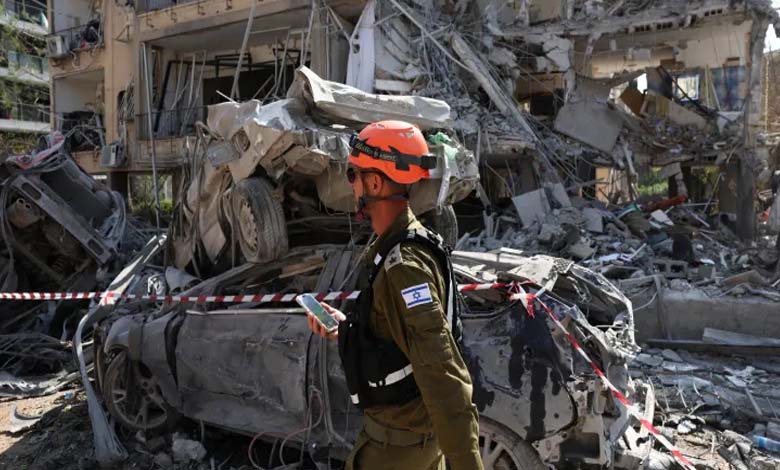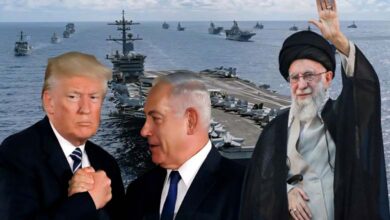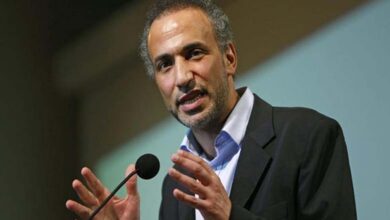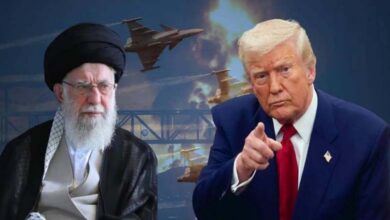Iran and Israel: Cross-Strikes… Is There Still a Window for Nuclear Negotiations?

As Iran and Israel exchange strikes, diplomacy has taken a back seat — despite several recent rounds of negotiations between Tehran and Washington.
But does this mean diplomacy is dead on the nuclear file?
-
No Ceasefire in Gaza until De-escalation between Iran and Israel
-
Troubles and Crises: International Economy Affected by Iran and Israel Events
According to The New York Times, efforts to reach an agreement on Iran’s nuclear program may still be revived, even after Israeli strikes disrupted the latest round of talks.
The paper writes: “Even amid what could become a war, the possibility of resuming talks to address Iran’s expanding nuclear program should not be ruled out.”
The Israeli campaign may last days or even weeks, and Iran continues to respond. Meanwhile, Washington has so far made no moves to pressure either side to halt the violence or resume dialogue.
-
Anticipation and Preparations in Israel for a Double Attack from Iran and Yemen
-
Israel and Iran: Everything You Need to Know About The Fire Saturday
Iran Wants to Negotiate
Tehran, along with former U.S. President Donald Trump, still favors reaching a deal. Any future negotiation format will depend heavily on when and how the current fighting between Tel Aviv and Tehran ends.
Iranian Foreign Minister Abbas Araghchi told foreign diplomats in Tehran last Sunday: “We are ready for any agreement that guarantees Iran will not seek nuclear weapons.”
However, he stressed that Iran would not accept any deal that “strips the country of its nuclear rights,” including the right to enrich uranium — even at low levels for civilian use.
He also claimed Israel’s strikes were “an attempt to sabotage diplomacy and block negotiations,” a view shared by many Western analysts, according to The New York Times.
-
Israel Vows Retaliation as Iran Issues Threats — Red Lines Crossed and Strikes to Continue
-
Israel Launches Massive Strike on Nuclear and Missile Facilities in Iran
Israel’s Justification
Israeli Prime Minister Benjamin Netanyahu defended the attack as a necessary measure to prevent Tehran from developing nuclear weapons, even as a sixth round of talks between Iran and the U.S. was scheduled to begin.
Israel’s Calculations
Israel argues it had to act now to stop Iran from accelerating its bomb-making capability. Yet U.S. and European intelligence estimates indicate Iran is still months away from reaching that point and has not made a final decision to proceed.
Netanyahu feared a potential U.S.-Iran deal would prevent him from achieving his goal of destroying Iran’s nuclear program — and possibly, as he hopes, toppling the regime.
-
Is an Attack Imminent? US Newspaper Reveals Israeli and Iranian Preparations
-
In Iran’s Eid Sermon: The U.S. and Israel Present with Warnings
But it is highly unlikely that Israel can destroy Iran’s nuclear infrastructure without active U.S. involvement — something Trump still refuses to provide.
Trump remains committed to a diplomatic solution. He appears to believe that Israel’s strike will force Iran back to the negotiating table in a weaker, more conciliatory position — willing to accept the demand to cease all uranium enrichment.
However, Iran insists it has the right to enrich uranium for peaceful purposes under the Nuclear Non-Proliferation Treaty (NPT).
-
Houthi Leader Admits Iranian Support and Threatens Israel
-
“Surprise” in Israeli Attack on Iran: Advance Warning of Date and Targets?
Vali Nasr, a professor at Johns Hopkins University and former State Department adviser under President Obama, said: “A quick deal that involves giving up enrichment would be seen as surrender and could make Iran’s government more vulnerable at home.”
He added: “They won’t give up enrichment — not that easily. They won’t surrender.”
Washington’s Role
Robert Malley, the former U.S. envoy who negotiated with Iran under Joe Biden, stated that talks are currently on hold. Their future timing and structure depend on how long the Israeli offensive lasts and what it accomplishes.
-
Leaks Reveal Israeli Preparations to Strike Iran and U.S. Concerns
-
Details of Iran’s “Recruitment” of an Israeli and His Girlfriend to Carry Out an “Assassination” Operation
Malley said Washington currently supports Israel’s operations, but: “At some point — the sooner, the better — the U.S. will need to show restraint” to contain the conflict.
According to The New York Times, Trump is eager to reach a deal and avoid being dragged into war.
Karen von Hippel, a former State Department official, agreed: “We’ll eventually return to the negotiating table — but at what cost to Israel and the region?”
She noted: “The challenge is that Iran will need a face-saving way to rejoin talks,” while Trump prefers to “push them into surrender.”
-
In Case of an Israeli Attack: Source Discusses Iran’s Plan and Target Bank
-
Iranian Missiles on Israel: Launch and Interception Costs
Unless the Iranian government collapses or Israel attempts to assassinate Iran’s political and religious leadership — as it did with Hezbollah — any future deal is likely to resemble the 2015 nuclear agreement that Trump withdrew from during his first term.
That deal blocked Iran’s path to a nuclear weapon but allowed uranium enrichment for peaceful purposes.
“The Best Path”
Susan Maloney, Iran expert and director of foreign policy at the Brookings Institution, stated that even if Iran’s government isn’t on the brink of collapse, it remains “weak and under severe threat.”
She concluded: “The path to a deal is unclear right now, but diplomacy still appears to be the best way out of this existential crisis for Iran.”












